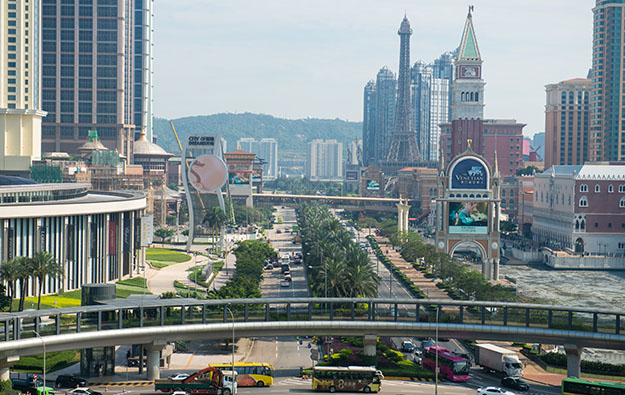Future of Macau casino licences unclear in 2019, says broker
Dec 19, 2018 Newsdesk Latest News, Macau, Top of the deck

The questions around the refreshment of gaming licences for the current six Macau casino operators will not be resolved next year, according to Morgan Stanley.
The stockbroking arm of the investment bank issued a note on Monday saying its view contrasts with the broadly held consensus in the market that the riddle of Macau’s gaming licence regime will be settled one way or another in 2019, causing fluctuations in the share prices of the city’s gaming operators.
Morgan Stanley expects no decision on licence refreshment until after the Macau SAR gets a new Chief Executive, next December. The decision to extend the first two licences up for renewal is likely in the first quarter of 2020, and a decision on the other four licences is likely in the following two years.
The concessions of the six current Macau operators expire on various dates in either 2020 or 2022, with the respective licences of SJM Holdings Ltd and MGM China Holdings Ltd set to expire in March 2020.
“We think that once this uncertainty is removed, it will have a much bigger and more positive impact than any potential for higher taxes or new competition,” the note says.
Macau’s gaming law states that the licences of the existing holders can be extended for a maximum of up to five years from their original expiry dates. But once a gaming concession contract expires, any new concession would have to be granted via a public tender. In that sense, say gaming lawyers familiar with the matter, there is no such thing in the Macau context as a “concession renewal”
In the view of the wider market, Morgan Stanley analysts Praveen Choudhary, Jeremy An and Thomas Allen said the effect of a decision on licence renewal next year may be disruptive for the prices of Macau gaming stocks. But even the worst outcome for the licensees may have only a minimal effect, they added.
The stockbroker imagines two scenarios, both of which it considers possible but unlikely. In one scenario, the effect is monetary. “We think it is likely that the [Macau] government could impose either a one-time fee or an ongoing revenue tax at a higher rate than the current 39 percent,” the note says.
In the other, more severe, scenario, the existence of gaming companies is threatened. “It may mean either partial loss of licence or competition from a new entrant.”
Morgan Stanley said its research suggests that disruption would be minimal. “We did a comprehensive quantitative analysis on these two risks in our Global Gaming Disruption Report and concluded that, unlike the consensus view that licence renewal will have a disruptive impact, we think the impact is likely to be controllable and still see upside potential for Macau gaming stocks in 2020-22 from current levels even if the most disruptive scenario occurs,” it said.
Macau’s Chief Executive Fernando Chui Sai On provided no guidance in the run up to the licence renewals in the Policy Address for 2019.
In the weeks since, there have been a number of interpretations offered. A 28-page analysis from brokerage Sanford C. Bernstein Ltd said it would be “virtually impossible to operate a casino without the cooperation of the real estate owner (i.e., the current concessionaire)”.
Brokerage Telsey Advisory Group LLC suggested it was concerned by the ambiguous future of the licences. “In last year’s policy address, Mr Chui had suggested that mid-2018 would be an appropriate time to address this issue,” a company research note said.
It added: “Last year the Macau government commissioned two studies on the gaming industry concession renewals, both of which were expected to be completed by the third quarter of 2018. We are obviously not in the third quarter anymore, and we are well past ‘mid-2018′. Given this, and considering the current geopolitical tensions between the United States and China, we are watching this situation closely.”
Related articles
-
 Star Ent shuts down EGMs, ETGs in all...
Star Ent shuts down EGMs, ETGs in all...Jul 15, 2024
-
 Macau govt to keep cap on junket...
Macau govt to keep cap on junket...Jul 10, 2024
More news
-
 Donaco EBITDA up y-o-y to above US$4mln...
Donaco EBITDA up y-o-y to above US$4mln...Jul 26, 2024
-
 HK listed Palasino upgrades Czech...
HK listed Palasino upgrades Czech...Jul 26, 2024
Latest News
Jul 26, 2024
Border-casino operator Donaco International Ltd has achieved a 164.17-percent year-on-year increase in its latest quarterly group earnings before interest, taxation, depreciation and amortisation...Sign up to our FREE Newsletter
 (Click here for more)
(Click here for more)
Pick of the Day
”We’ve got more traction outside of Macau at the moment. But Macau’s going be a bigger focus for us”
David Punter
Regional representative at Konami Australia
Most Popular
 Sheraton brand to exit Londoner Macao, to be Londoner Grand July 25, 2024
Sheraton brand to exit Londoner Macao, to be Londoner Grand July 25, 2024  Macau regulator probes unlicensed gaming agents July 24, 2024
Macau regulator probes unlicensed gaming agents July 24, 2024  Philippines gives 20k aliens in POGOs 60 days to leave July 25, 2024
Philippines gives 20k aliens in POGOs 60 days to leave July 25, 2024  Philippines-listed DigiPlus says not affected by POGO ban July 24, 2024
Philippines-listed DigiPlus says not affected by POGO ban July 24, 2024  Sands China 2Q EBITDA down q-o-q amid low hold, renovation July 25, 2024
Sands China 2Q EBITDA down q-o-q amid low hold, renovation July 25, 2024






